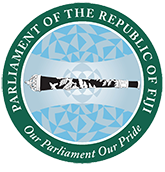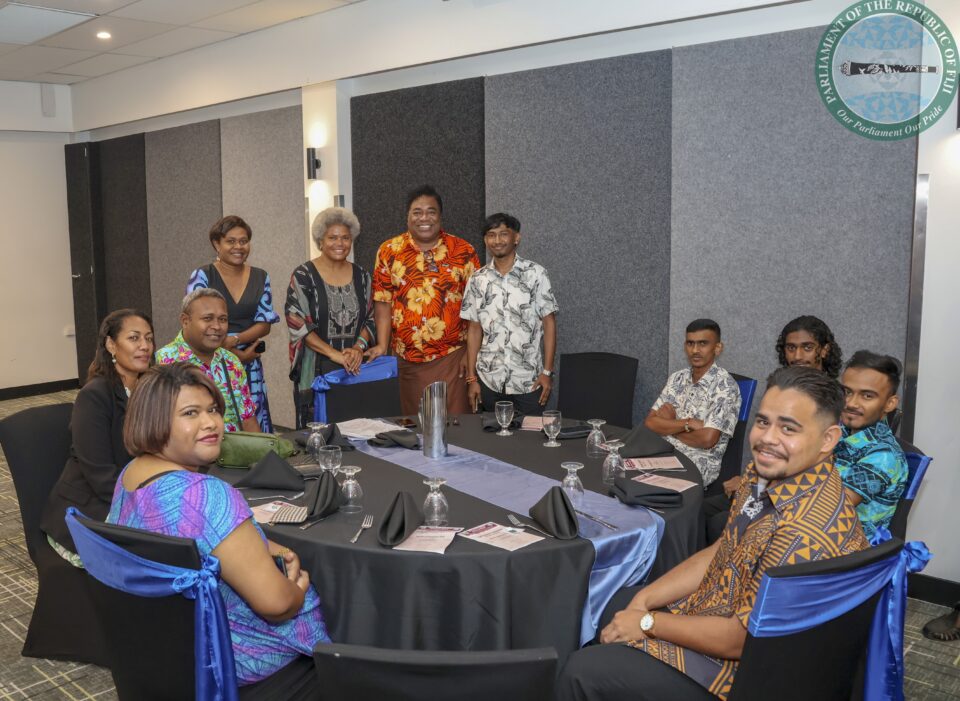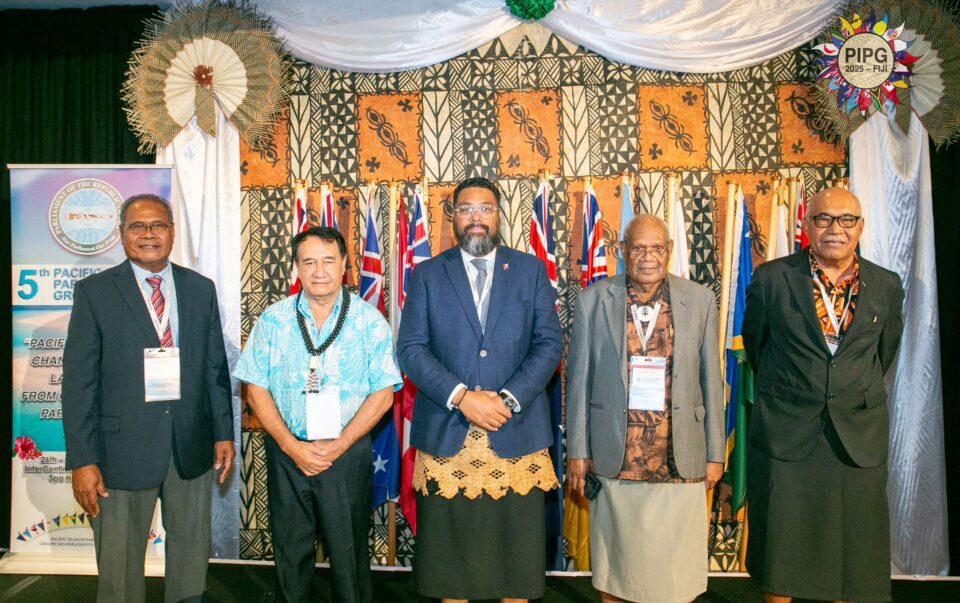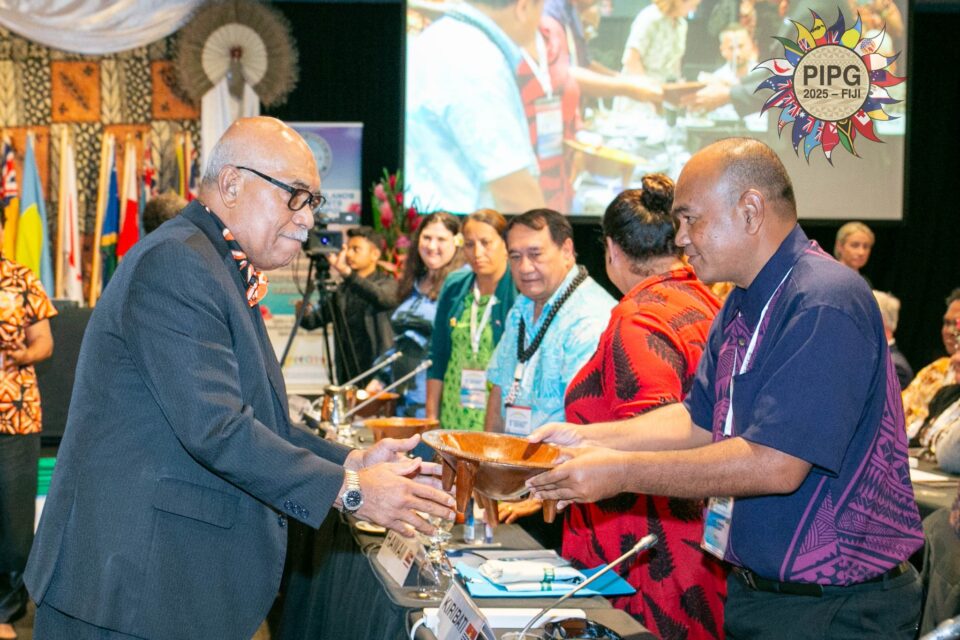Address at the Opening of the 2020-2021 Session of Parliament – HE Major-General (Ret’d) Jioji Konrote
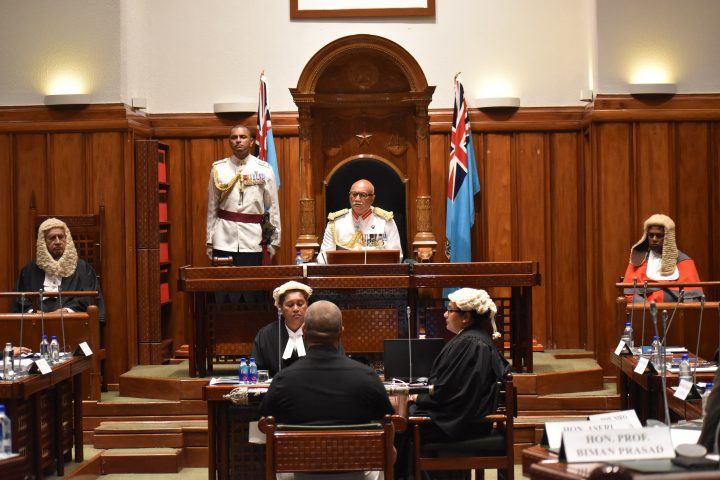
HIS EXCELLENCY
MAJOR-GENERAL (RET’D) JIOJI KONUSI KONROTE
CF, OF(Mil), MC, SBSt.J, MSD, OMRI, NOC
President of the Republic of Fiji
ADDRESS AT THE OPENING OF THE 2020-2021 SESSION OF PARLIAMENT
Parliament House Monday,30th November, 2020, 1000hrs
SUVA
———————–
Your Excellency, The Honourable Speaker;
The Honourable Acting Chief Justice and Honourable Members of the Judiciary;
The Honourable Prime Minister;
Honourable Cabinet Ministers and Assistant Ministers;
The Honourable Leader of the Opposition;
Honourable Members of Parliament;
Your Excellencies, High Commissioners;
Ambassadors and Members of the Diplomatic Corps;
Distinguished Guests;
Ladies and Gentlemen;
Ni Sa Bula Vinaka, Namaste, Asalaam Alaykum, Noaia ‘e Mauri, and a very good morning to you all.
We gather to open this 2020-2021 session of parliament in the midst of a global crisis. Beyond our borders, the spread of the deadly novel coronavirus is the most serious it has ever been. Rates of infection are at all-time highs. The loss of life mounts by thousands every day. As the Northern Hemisphere enters the colder weather of the traditional flu season, it is clear the worst is yet to come.
Fiji bit the bullet early and did the hard work of locking down the country to protect our people. In a truly patriotic, whole-of-nation effort, we achieved what few countries could; we contained the virus. It has been more than 220 days since the last case of COVID-19 among the public. Together, we potentially saved thousands of Fijian lives. And on the 10th of October, as a COVID-Contained country, Fijians marked the 50th anniversary of our independence in good health and in good spirits. We have every reason to celebrate what we have achieved. Never before in our half-century history have we encountered and overcome a challenge as deadly as COVID-19.
Our doctors and nurses, and the members of our disciplined forces deserve much more than our gratitude. For their sake as well as our own, we must remain vigilant and disciplined as we face the threat that is very much before us, and very much alive. We may feel safe from the suffering of this pandemic, here in our COVID-contained country in the middle of the Pacific. I can assure you that we are not. This virus will never offer humanity an unconditional surrender. Countries, states, and cities that thought they had this virus on the ropes have seen the return of this insidious, invisible and unrelenting enemy. To everyone in this chamber and to everyone tuning in from across the country, I urge you: Do not forgo the health practices and habits we have adopted this year. For starters, I hope everyone here has downloaded and installed the careFIJI mobile contact tracing application. As parliamentarians, as dutiful parents and grandparents, and as caring children, we must remain ever alert and ever mindful of the consequences of any lapse in caution. We have worked too hard and sacrificed too much to give ground in our shared campaign to contain this virus.
Fiji’s public health response was an enormously complex effort, though I believe we owe our success to two simple truths: Our faith in one another, and our respect and adherence to science. Our success answered countless prayers and affirmed the science-based health protections we decisively implemented. It has been a testament to what our people can achieve when we put our nation first, respect the rule of law, conquer our panic, and place our trust in strong leadership and in each other. That spirit of courage and cooperation matters more than ever today as we strive to keep the virus at bay while building back our devastated economy—because, make no mistake, our ability to re-establish the strong economy we have built over so many years is very much at stake. Our people’s livelihoods are at stake. And building our economy back will take an effort as decisive, as cooperative, and as patriotic as what it took to contain the virus itself.
Mister Speaker, we have a constitution that enshrines a vast array of civil, political, and socioeconomic rights that government must make every effort to realise and defend for all Fijians. Alongside the right to health is the right to economic participation, the right to water, the right to education, the right to work and a just minimum wage, the right to food and water, the right to equality and freedom from discrimination, the freedom of religion, and other rights which all are pivotal to the liberty and wellbeing of every Fijian. The right to health may have taken on a new significance due to the coronavirus, but it does not supplant the other constitutional rights of our citizens. With a secure and well-managed border between our people and the coronavirus, my government will continue the progressive realisation of our constitution’s mandates in every way it can, by bringing back employment, incentivising investment, maintaining the socioeconomic and civil and political rights that underpin our society, pursuing sustainable development, building our climate resilience, and breathing new life into our economy.
To do so, we must build on the progress of the last national budget and our Fijian COVID-Safe Economic Recovery Framework. In recognition that many Fijian families are enduring the hardest year they have ever known we must continue our support for all those who need it. As we must continue to support strong domestic investment as well as prepare for the safe re-opening of our borders to secure Fiji’s place in the global economic recovery.
Honourable Speaker, the Honourable Chief Justice, the Honourable Prime Minister, Honourable Cabinet Ministers, the Honourable Leader of the Opposition, Honourable Members of Parliament, Excellencies, Ladies and Gentlemen.
The prospects for global economic growth have deteriorated from uneven in the months prior to this pandemic to wildly uncertain. To quell economic anxiety and maintain confidence, Governments globally have borrowed and spent tens of trillions of dollars to keep their economies, industries, and businesses above water and to maintain the livelihoods of their people at some acceptable level. The spending breaks records by the day, with total global stimulus already more than triple that of the global financial crisis. Among many examples, the United Kingdom, the world’s sixth-largest economy, has seen its sharpest economic contraction since the 1700s. In response, the UK is borrowing at levels unmatched since the Second World War.
All around the world, all the indicators tell us, this new era of flexible fiscal policy may be with us for quite some time.
Due to the travel-related nature of many of our most important industries, small island states like Fiji have been hardest hit by this global economic emergency. Our paths to recovery are the longest, therefore our efforts must be the most ambitious. Through the coming months and years, the pace of our recovery through our industries, our business houses, and our people’s employment must indeed exceed that of the rest of the world.
To achieve that, we must take a considered view of where the world economy stands today and stake a confident position in where it is headed. We can take some comfort in the fact that several newly-developed vaccines are showing promise. Though we anticipate there will still be many long and hard months ahead, we will not succumb to cynicism. As a wave of newfound economic confidence slowly yet surely sweeps across the world, we will keep our gaze set on the opportunities available to us in the not-too-distant, post-COVID future.
For all the uncertainty of that future will bring, we can be sure the oceans and climate crises have not rested for this global pandemic. They are still upon us, the rising seas are claiming of our coastlines, our reefs are disappearing, storms are becoming stronger, and farming is being impacted by changing weather patterns. These impacts will no doubt intensify. No matter the crushing economic impact of this pandemic, building our resilience cannot be relegated to the backburner. We either adapt now, or risk everything our people have built over the last 50 years.
As we press ahead in our work to drive bluer, greener, more inclusive, and more sustainable development, the government’s focus in this parliamentary session will be centred on three key priorities:
- Our containment of COVID-19;
- Our economy’s recovery; and
- Our response to the climate, oceans and biodiversity crises.
Our commitment to remain COVID-Contained must be engrained in all of the work of this August Parliament. It must materialise through the funding we grant our frontline health officials, the equipment we provide them, and through our advocacy on the world stage to secure equitable access to an effective COVID-19 vaccine. Particularly as we look to re-engage economically with the world, the health of every Fijian must sit at the heart of our recovery. Though we remain mindful that the coronavirus is only one of many serious threats to Fijian lives. My government will continue to ensure life-saving treatments – such as kidney dialysis – are made both affordable and accessible to our people. And we will meet the scourge of non-communicable diseases with a national effort to strengthen Fiji’s nutrition security and encourage life-style changes that set Fijians on better, healthier paths. Across our efforts to provide Fijians with the best possible advice and treatment, we must deepen our collaboration across the medical field, including with general practitioners in private practice who can and must join us at the forefront of addressing every health challenge Fijians face.
Our people’s wellbeing also cannot be separated from our economy’s recovery. We cannot settle for providing struggling Fijians with short-term assistance, we owe them each the opportunity to work again in jobs they have loved, in established sectors with potential for growth, as well as in emerging, cutting-edge industries. My government has led by example within the Fijian civil service, where there have been no pay cuts below the rank of permanent secretary. With many salaries still sitting at all-time highs, we must expect a commensurate rise in efficiency, professionalism, customer-centric service, and innovative, out-of-the-box thinking from every civil servant. We must use this chance to fast-track our merit-based, people-first organizational culture throughout every ministry and department, statutory body, and public enterprise. And we must tap the efficiency of the private sector through outsourcing and public-private partnerships.
Unshackled by the most severe of our health restrictions and buoyed by an historic government stimulus, the Fijian economy as well has the chance to strategically enhance its long-term edge by positioning itself for opportunity in the new normal. Though we must take great care to avoid the pitfall of an unequal recovery.
In too many developed countries, large multi-national companies have survived, and even thrived, throughout this crisis as smaller businesses have fallen through the cracks. Fiji’s recent progress in dramatically reducing inequality in our society cannot be thrown off course by falling prey to that same global trend. We will add to the tens of millions of dollars in concessional loans we have granted in support of micro, small, and medium enterprises. For the first time, we have collaborated with the Fiji Institute of Accountants, the Fiji Chamber of Commerce and Industry, Women in Business, and the Fiji Commerce and Employers Federation to assess applications for these concessional loans, and we look forward to continue working with private sector organizations to help fuel an inclusive recovery and grow the role of all businesses, including MSMEs, in our long-term economic expansion.
In many countries, COVID-19 shutdowns have cut directly into student’s access to education. We are blessed that young people are free to continue Fiji’s education revolution in classrooms across the country. Every year, we add new graduates to the most talented and capable workforce in Fijian history. That surging human capital is a precious resource that must not be wasted. Young Fijian’s great ambition is rivalled only by their innovative potential which can spur the badly-needed modernisation of businesses, entire industries, and indeed in the civil service as well. As economies far and wide adapt to the new economic realities of this pandemic and beyond, young Fijians must be afforded the opportunity to bring their new ideas to bear.
The long-standing trend of digitisation, for example, has accelerated at a break-neck pace. Businesses are serving customers through new arrays of digital tools. Local, regional and international meetings are being convened through online platforms. Whole industries are being re-shaped. Fiji was prepared for this new economy well before COVID-19 thanks to a decade of reform and investment in the information and communications technology sector, which is now spearheaded under the digitalFIJI umbrella. As the region’s leader in digitisation, we must continue to leverage digital technology to improve the reach of government and financial services and ensure the Fijian economy remains competitive in a rapidly-digitising world. It is one key way we build our resilience to external shocks like pandemics, as well as climate change.
On the climate front, Fijians remain on the frontlines of the worst climate impacts while Fijian voices stay at the forefront of the global campaign to curb emissions and build a more resilient world. We cannot relent in adapting Fiji communities here at home nor in advocating for the urgency of achieving net-zero carbon emissions by 2050 from all nations on Earth. The most powerful way we lead is through our example. By decarbonising how we live and how our economy grows, by achieving our commitment to the 100 per cent sustainable management of our oceans, we help inspire the same around the world, ultimately securing a future for our planet that our children and grandchildren deserve.
Those aspirations are embodied in the government’s legislative agenda for this session, some of which has carried over from the last session due to the pressing work of containing Fiji’s outbreak of COVID-19: Parliament will consider the Climate Change Bill; Intellectual Property laws: Patents, Trademarks and Designs Bills; the Volatile Substances Abuse Control Bill; the Search and Rescue Bill; the Child Justice Bill; the Child Care and Protection Bill; the Traditional Knowledge and Cultural Expressions Bill; the Anti-doping Bill; the National Payment System Bill; the Refrigerants Management Bill; the Ozone Depleting Substances Bill; the Micro, Small and Medium Enterprises Bill; the Landlords and Tenants Bill; the International Mediation Bill; Electoral Law Reforms; and the Hotel Data Collection System Bill. As well as conduct a wide-range of reviews of legislation, ranging from public health, to customs, to the legal frameworks supporting our disciplined forces.
Honourable Speaker, the Honourable Chief Justice, the Honourable Prime Minister, Honourable Cabinet Ministers, the Honourable Leader of the Opposition, Honourable Members of Parliament, Excellencies, Ladies and Gentlemen.
Before I formally open this new session of Parliament, I want to thank all of those behind-the-scenes who helped us mark Fiji’s 50th Birthday this past October, as well as all the Fijians who proudly joined us at events across the country, and who tuned in to the celebrations from home. We did not imagine our 50th year of independent history would be met by a challenge as serious as COVID-19, yet it did not break us. When history tells of how we marked our half-century of independence, it will remember our resilience. Coming generations will remember our patriotism. They will find inspiration in the strength of our spirit. And I believe they will recall this year as a moment where – amid great difficulty – Fiji found opportunity that paid dividends over decades for the wellbeing of our people, for the modernisation of our economy, and for our leadership to secure all people and our planet a better future.
The work of the next 50 years begins with this session, which I now have the honour to declare officially open. May Almighty God Bless you all. May God Bless Fiji.
Vinaka Vakalevu, Sukria, Bahoot Dhanyavaad, Fai’aksea and Thank you.

